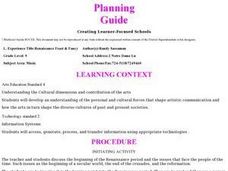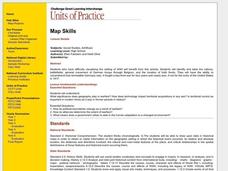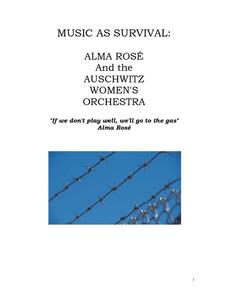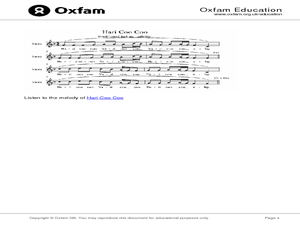Curated OER
Renaissance Feast & Fancy
Ninth graders investigate the recreation, music, clothing, and food of the Renaissance period. In small groups, they research a topic, and plan activities, music, food, and costumes to be used in a Renaissance Feast.
Curated OER
Eckstine, Stayhorn, and the Dorseys: Masters of Swing
Students explore the history of swing music. In this music history lesson, students research the Dorsey Brothers, Billy Eckstine, and William Strayhorn to learn about swing music. Students define swing, develop a timeline of events in...
Curated OER
Rock n' Rollin in the '50s
Students explore the culture of the United States in the 1950's. In this history lesson plan, students research culture in the 1950's, with a focus on fashion, music, television, automobiles, etc., then work in groups to create a...
Curated OER
Scops, Rappers and You: Historians with Style!
Students examine the epic poem Beowulf. In this analyzing poetry lesson, student compare listen to the Will Smith song "Wild, Wild West" and read Beowulf. Students analyze the song and the poem. Students then research an influential...
Curated OER
History Trifold in Publisher
Students create a timeline of events happening around the world. In this timeline lesson plan, students use Microsoft Publisher to create a timeline of events happening around the world as they live their lives presently.
Curated OER
Democracy…Not Yet!
Students analyze the concept of democracy. In this democratic values instructional activity, students analyze the lyrics of selected popular music that address issues that challenge the role of United States as a world leader. Students...
Curated OER
Primary Source: Churchill Speaks to the British People
In this World War II instructional activity, students read an excerpt of a speech from Winston Churchill to the British people. Students then respond to 5 short answer questions based on the speech.
Curated OER
Map Skills
Students examine the nations, battlefields, troop movement of the Germans through Belgium and the location of both fronts during World War I by creating a map. They visualize the strength of the Germans early in the war.
Curated OER
The Mosaic School
Students complete activities to learn about world cultures. In this multicultural lesson, students define the terms diversity, culture, and mosaic. Students research their family's country of origin and complete activities using the...
Curated OER
The Impact of Islamic Culture on the Arts of the Renaissance
Eighth graders examine the linguistic and cultural impact of the Arabic language and Islamic culture on the Spanish language. They analyze and label maps, listen to and differentiate between Spanish and Arabic music, and compare and...
Curated OER
Rhythm Nation
Learners read a New York Times article to help them develop an understanding of the history, development, and social influence of various types of world music through the creation of music museum exhibits.
Curated OER
America (My Country 'Tis of Thee)
Students perform a song using correct rhythms, accurate pitches, and dynamic phrasing. They perform an accompaniment to "America" on Orff instruments.
Curated OER
Night: Guided Imagery Activity
Prior to reading Night, class members engage in a guided imagery activity that helps them make text-to-self connections to Elie Wiesel’s account of his experiences with his father in Auschwitz and Buchenwald. Complete directions, as well...
Curated OER
Geography: Puerto Rico
Take a trip to Puerto Rico! Learners engage in a web quest, identify Puerto Rico on the map, and gather information related to physical features and cultural factors. Their efforts culminate when they design a brochure comparing the...
Curated OER
African American Achievers
Pupils complete research projects. Students research the achievements of various African Americans and their contributions to the world. They use various resource links on the Internet to become more knowledgeable about the topic.
Curated OER
Music and Dance Celebration
Third graders demonstrate effective use of a Venn Diagram Graphic Organizer by comparing and contrasting music and dance. They discover how different cultures around the world celebrate with music and dance.
Curated OER
Global Happiness Through Music
Seventh graders discover their cultural and musical identities by collecting data and make journal entries. They create music artist booklet highlighting their musical tastes. Students perform music selection for an audience.
Curated OER
Music As Survival: Alma Rose and the Auschwitz Women's Orchestra
Students explore a period of European history in which musicians have used theri musical talents and abilities to survive and rise above extremely difficult situations. The psychological uses of music by the Nazis is examined in this...
Curated OER
Sound--Music or Noise?
Students are introduced to the concept of sound and how it is presented in the world around them. Using scientific terms, they describe the properties of sound and create their own definitions of sound, music, and noise. They demonstrate...
Curated OER
Over There with World War 1 Songs
Fourth graders listen to and interpret songs from World War 1. They discuss the importance of radio as a mass media during the time period. They use the Internet or books to answer questions about song lyrics.
Curated OER
People of the Plains:Music and Dance
Fourth graders are given a worksheet stating the goal of the day, different sections to visit, and time spent on each section. They are given the CDs, 4th graders are told to insert the CDs into the computer. Students go to The Plains...
Curated OER
Lullabies From Around the World
Young scholars investigate lullabies from Ghana, Poland, and India. In this music lesson, students learn several lullabies from several countries and find the rhythm and pulse within each song.
Curated OER
The History of Rock and Roll: Part 1 - Rock and Roll Explodes Music Reflects The Times
Students examine technological advancements in music and broadcast over the decades.
Curated OER
Does Music Cam the Savage Beast?
Students collect, graph and analyze data. For this statistics lesson, students measure the heart beat of a person as they listen to music. They use the CBL and TI to create a graph, analyzing the outcome.

























